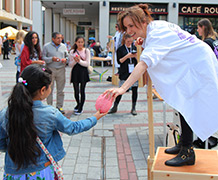
Princesshay Square will become a hub of hands-on learning for all on June 11th.
Women scientists bring their subject to life on Exeter streets
Female academics from the University of Exeter, the Met Office and beyond will tackle some of the world’s biggest questions in a fun and engaging way when Soapbox Science hits the streets of Exeter.
Princesshay Square will become a hub of hands-on learning for all on June 11th, in a free event which sees women scientists holding fun and accessible talks and demonstrations.
The scientists will tackle questions such as how can maths help us to understand our movements and tell us about our personality traits? What do mud and fossils from the bottom of the sea tell us about ancient climate change and how do neurons make our brain function? The event is part of a nation-wide initiative by Soapbox Science, which aims to bring science to the people and challenge gender stereotypes in science careers.
The nationwide initiative will see more than 160 female scientists take to their soapboxes in 13 UK cities across England, Wales and Scotland this summer in its aim to help eliminate gender inequality in science by raising the profile of women in the field, and challenging the public’s view of what a scientist is. In the UK, women account for 35 per cent of PhD science graduates, but only 11 per cent of senior lecturers and less than eight per cent of professors.
Six presenters from the University of Exeter will join leading women scientists from the Met Office, and other external academic institutions. Soapbox Science events are part funded by the Science and Technology Facilities Council and the upcoming Exeter event is co-sponsored by the University of Exeter, the College of Life and Environmental Science and the Met Office.
Dr Safi Darden, a lecturer in Psychology who is helping coordinating the event, said: “We have some fantastic women scientists across a wide range of disciplines lined up for the event. We’re really looking forward to showcasing their expertise in an accessible and fun way, and we hope people in Exeter and beyond will come along and meet them on June 11.”
Felicity Liggins, a senior applied climate scientist at the Met Office and event coordinator said: “I believe that people of all ages and backgrounds can get engaged with the fantastic science that’s being done at the Met Office and in other scientific institutions across the UK – but only if they hear about it from inspiring speakers. Soapbox Science gives us the chance to talk about the work we do here at the Met Office, some of which might surprise our audiences, as well as highlighting the diverse and fascinating roles available for women in science.”
The speakers, who range from PhD students to professors, will use props, experiments and specimens to entertain the crowd and will include the following women scientists from the University of Exeter and the Met Office:
Dr Kate Littler, a lecturer in Geology from the Camborne School of Mines which is based at the University’s Penryn campus, will pose the question: ‘How can mud and fossils from the bottom of the sea tell us about ancient climate change?’
Krasimira Tsaneva-Atanasova, Professor of Mathematics for Healthcare, will explain what the way we move says about us and how maths can be used to understand how our movements give a sneak peek to personality traits.
Isabel Castanho, a University of Exeter Medical School PhD student will talk about the 'exciting world of neurons and how they make our brain function'.
Dr Olivia Champion, a research fellow from the Department of Biosciences will explore the topic of the 'Microbe: the good, the bad and the ugly'.
Dr Regan Early, a lecturer in Conservation Biology, will present a snakes and ladders style board game called 'The Great Climate Change Race' around the theme of how species adapt to rising temperatures.
Stacey Heath, who is a PhD student in Psychology will explore the impact of urban regeneration schemes on social identity and community.
Dr Claire Burke, an attribution scientist at the Met Office will pose the question: 'How do the most massive galaxies form and evolve and what does this tell us about the origin of the Universe?'
Ms Rebecca Hemingway, who is a weather impacts scientist at the Met Office, will explore how the weather and natural hazards affect us all.
Dr Ayoe Buus Hansen, Met Office atmospheric dispersion and Air Quality Research, will talk about soap bubble science and atmospheric motion.
Soapbox Science co-founder, Dr Seirian Sumner of the University of Bristol, said of the national initiative: “By showcasing the diversity of women in science, we hope to challenge both the public and scientific communities to think again about who a scientist is: there is no ‘typical scientist’. By challenging perceptions among people of all ages, we hope to influence the choices of the younger generation and their families and friends, making it acceptable and normal for girls from any background to follow a career in science.”
Date: 24 May 2016
